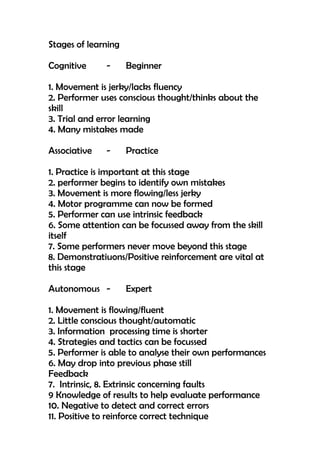More Related Content
Viewers also liked
Viewers also liked (8)
Similar to Stages of learning
Similar to Stages of learning (20)
Assessment 1 Develop and maintain professional competenceSubmiss.docx

Assessment 1 Develop and maintain professional competenceSubmiss.docx
Levels of Student Skill acquisition in teaching methodology

Levels of Student Skill acquisition in teaching methodology
Knowledge Retention: A Successful Bottom-up Approach

Knowledge Retention: A Successful Bottom-up Approach
More from ashfieldpe
More from ashfieldpe (11)
79463 question-paper-unit-g451-01-an-introduction-to-physical-education

79463 question-paper-unit-g451-01-an-introduction-to-physical-education
60440 question-paper-unit-g451-an-introduction-to-physical-education

60440 question-paper-unit-g451-an-introduction-to-physical-education
60440 question-paper-unit-g451-an-introduction-to-physical-education

60440 question-paper-unit-g451-an-introduction-to-physical-education
Stages of learning
- 1. Stages of learning Cognitive - Beginner 1. Movement is jerky/lacks fluency 2. Performer uses conscious thought/thinks about the skill 3. Trial and error learning 4. Many mistakes made Associative - Practice 1. Practice is important at this stage 2. performer begins to identify own mistakes 3. Movement is more flowing/less jerky 4. Motor programme can now be formed 5. Performer can use intrinsic feedback 6. Some attention can be focussed away from the skill itself 7. Some performers never move beyond this stage 8. Demonstratiuons/Positive reinforcement are vital at this stage Autonomous - Expert 1. Movement is flowing/fluent 2. Little conscious thought/automatic 3. Information processing time is shorter 4. Strategies and tactics can be focussed 5. Performer is able to analyse their own performances 6. May drop into previous phase still Feedback 7. Intrinsic, 8. Extrinsic concerning faults 9 Knowledge of results to help evaluate performance 10. Negative to detect and correct errors 11. Positive to reinforce correct technique
